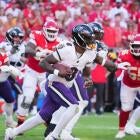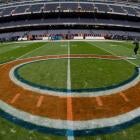
Lions final report card -- 2012: Solid stats don't mitigate subpar record
Throughout their 4-12 season, the Lions maintained they were a far better team than their record indicated. Statistically, they're right. Detroit ranked in the middle to upper part of the NFL in several key categories that proved it possessed the talent to win.
Throughout their 4-12 season, the Lions maintained they were a far better team than their record indicated. Statistically, they’re right. Detroit ranked in the middle to upper part of the NFL in several key categories that proved it possessed the talent to win. The problem is statistics don’t guarantee victories, and the Lions didn’t get the job done in crunch time for most of the year.
The disparity between statistics and results earned the Lions mostly average grades on their postseason report card -- and as anyone in the Lions’ locker room will readily admit, “average” isn’t good enough.
Writer’s note: The letter grades contained in this report card are an average of the letter grades the respective units received on their weekly performances since RapidReports began issuing postgame report cards in Week 3, plus an examination of the team’s performances in Weeks 1 and 2
Offense: C --The offense was able to move the ball well for most of the season thanks to a solid performance by Matthew Stafford, and an all-world effort from WR Calvin Johnson. Stafford’s 4,967 passing yards were marred somewhat by his 17 interceptions and four fumbles lost. It’s worth noting that his 20 passing TDs were less than half his total from last season. The unit’s problem was that while it was ranked third in the NFL in yards per game (408.8), it was 17th in the league in points per game (23.3). An injury-depleted WR corps crippled the Lions’ chances in key situations, and an inability to convert red zone trips to points cost them dearly. The run game averaged over four yards a carry, but Mikel Leshoure and Joique Bell didn’t author the consistent performances needed to draw coverage away from Lions’ receivers.
Defense: C+ -- Lions’ coaches and players agree the team’s unacceptable -16 turnover margin was a major factor in Detroit’s failures. The lack of takeaways can be traced to injuries that decimated the secondary and D-line. Even when healthy, the secondary lacked true playmakers, and opponents exploited that weakness to the tune of 27.3 points per game. The pass rush lacked the ferocity that made the defense one of the league’s most potent units last season, and injuries to three of Detroit’s top four DTs didn’t help. DT Ndamukong Suh was the front four’s most consistent performer, and he deserves praise for a consistently solid effort. The linebacking corps didn’t hurt the team’s performance, but it didn’t stand out either. Despite all its faults, the defense deserves credit for keeping Detroit in several games while the offense struggled to find its form.
Special teams: C -- Kicker Jason Hanson converted 32 of 36 field goals, and all four of his misses came from outside 40 yards. Hanson struggled with kickoff placement early in the season, but rebounded to end the year strong. Detroit’s kick and punt coverage teams were dismal over the season’s first eight games, and they cost the Lions wins in Weeks 3 and 4 by allowing four return touchdowns. The unit got better when players like Erik Coleman and John Wendling were able to focus on special teams after being relieved of their starting duties caused by injuries to the secondary. Detroit’s punting was unimpressive all season. Kick returner Stefan Logan struggled, and was replaced in Detroit’s last game.
Coaching: C- --A lot of the plays that cost Detroit wins were the result of player error and lapses in judgment, and it’s tough to blame that on Jim Schwartz and his staff. The coaches do deserve rebuke for playcalling that was too predictable in key situations, and their difficulties adjusting game plans when injuries changed the personnel at their disposal. All three coordinators are expected to return for 2013, and they need to create a game plan that keeps opponents guessing far more than they did in 2012.
Cumulative GPA: 2.0
Follow Lions reporter John Kreger on Twitter at @CBSLions and @JohnKreger.
















